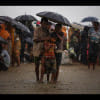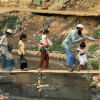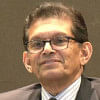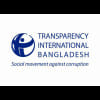Has the ICC lost traction on Rohingya genocide case?

The resolution of the Rohingya crisis appears to have met a dead end. Quite predictably, yet another round of questionable repatriation efforts has stalled. With dwindling financial commitment, agencies tasked to look after the refugees are finding it extremely difficult to make ends meet. Squalid living conditions in camps compounded by restrictions on freedom of movement, reduced supply of rations, deteriorating law and order situation coupled with absence of education, skills development and work opportunities, and protracted uncertainty of repatriation have taken a huge toll on the refugees, both physically and psychologically. While some have resigned to such a reality, others, particularly the young ones, are looking for opportunities to escape the fenced camp life and Bhasan Char. Data from the United Nations High Commissioner for Refugees (UNHCR) shows that in 2022 alone, more than 3,500 Rohingya tried to undertake perilous journeys through the Bay of Bengal and Andaman Sea. This is a 360 percent increase from the previous year.
The Rohingya have been subjected to a slow burning genocide over the last 40 years, and despite being recognised as "the most persecuted minority in the world" by the UN, they have been largely forsaken by the international community that is essentially guided by economic and strategic interests while paying lip service to human rights principles and international law. The community's efforts to seek justice and accountability for the perpetrators of genocide and other state crimes appear to have hit a roadblock in recent times.
The International Criminal Court (ICC) is a court of last resort that investigates alleged war crimes, crimes against humanity and other grave offences when nations are unable or unwilling to do so. In an overall grim situation, the request of the last ICC prosecutor on the determination of the jurisdiction pursuant to the Rome Statute (in April 2018) and the subsequent ruling of the ICC's Pre-Trial Chamber (in September 2018) that it has jurisdiction to hold the Myanmar government to account provided a glimmer of hope to the hapless Rohingya. The judges urged the prosecution not to delay in pursuing their task.
However, contrary to the hype that the ruling had generated among those who champion human rights, justice, accountability and the rule of law, the Rohingya genocide case appears to have taken a back seat in ICC priorities. The issue becomes evident if the treatment of the Rohingya case by the ICC is compared with the court's dealings with the Ukrainian case.
In the Ukrainian case on March 2, 2022, the chief prosecutor of the ICC announced the opening of an investigation of all "past and present allegations of war crimes, crimes against humanity or genocide" committed by Russia in the war in Ukraine, which had begun a week earlier. Days earlier, his office announced that it already had "a reasonable basis to believe crimes… had been committed." Not surprisingly, his move received strong international political support, with 39 countries having referred the Ukraine situation to the office of the prosecutor for investigation.
Within months, the European Commission launched a new project to support the investigation capacities of the ICC by committing 7.25 million euros. In particular, the resource "will help the ICC to scale up its investigation capacity to respond to the ongoing investigations into war crimes committed by Russia in Ukraine." Announcing the support, the high representative/vice-president of the European Commission reiterated, "the International Criminal Court's investigations are crucial to ensure accountability and justice for the heinous crimes committed in Ukraine."
In April 2022, Eurojust (the European Union Agency for Criminal Justice Cooperation) and ICC agreed to join forces and for the court to participate in the EU's Joint Investigation Team. The information on possible war crimes and crimes against humanity is currently being collected to enable investigation and adjudication by relevant actors in the future to ensure that those responsible for war crimes and other atrocities are held accountable. There are also moves to further scale up the office's data storage and processing infrastructure and to build up additional analytical and forensic capacity for new types of evidence, including digital.
On March 17 this year, the ICC issued an arrest warrant against the Russian president and commissioner for children's rights, accusing them of being responsible for war crimes in Ukraine, including the unlawful deportation of children. Within a week, on March 23, the prosecutor general of Ukraine and the registrar of the ICC signed a cooperation agreement on establishing an ICC country office in Ukraine.
There is a stark difference in the ICC's treatment of the above case with that of the Rohingya genocide. While the apex global criminal court has demonstrated its interest and competence in engaging with Ukraine's case, it has exposed its apathy and indifference to the Rohingya case. This is obvious on the following counts:
First, within less than 18 months of the opening of the investigation in Ukraine, the ICC was able to open a field office there, and there is already an arrest warrant. In contrast, nearly four years into the investigation in the Rohingya genocide case, there is no arrest warrant; there is not even a field office opened in Bangladesh.
Second, the new prosecutor is on record that accountability for crimes against/affecting children is a "priority" to his office. The world is aware that many Rohingya children, including babies and infants, were victims of state crimes in Myanmar. Why, then, are they not a priority to the prosecutor as the Ukrainian children are? Do the Rohingya children not deserve justice?
Third, the prosecutor has called for friendly governments to send investigators, lawyers and military experts to help with the investigation in Ukraine, and it has been reported that more than 40 experts have been seconded by EU states alone. In contrast, thus far, there is no information available on whether the prosecutor has made requests to governments to send personnel to help with the Rohingya genocide investigation. Can one, therefore, surmise that the Rohingya case is not being treated as a priority like the Ukrainian case?
Fourth, while the prosecutor deserves accolade for his efficiency in requesting an arrest warrant in the Ukrainian case within a relatively short time, he seems to be in no hurry to request an arrest warrant against the murderous Myanmar military leaders. Does he expect the Rohingya refugees to wait indefinitely in Bangladesh in atrocious and harmful conditions, with dwindling international support and an increasingly hostile environment?
Fifth, is the prosecutor cognisant of the facts that: a) rations are now below the international standard; b) camp people are subjected to physical threat and extortion; and c) sexual violence is rife in the camps?
Sixth, given the prosecutor's stated commitment to the rights of children, is he not concerned that: a) half a million Rohingya children are being denied even primary education; b) half a million children are being malnourished as their parents and caregivers are made dependent solely on ever-decreasing rations; and c) half a million children are growing up in a place where murders, extortion, and sexual violence are rife and increasing?
Seventh, does the prosecutor share the view that construction of government buildings and settlements on Rohingya land, as well as the destruction of their villages, reveal the Myanmar government's ulterior motives and lack of sincerity in addressing the Rohingya question? Isn't he concerned that plans under consideration by the governments of Bangladesh and Myanmar to repatriate the Rohingya refugees from Cox's Bazar back to internment camps in Myanmar will undermine their rights and impair their security?
And finally, how will the prosecutor protect the witnesses who have spoken to his team when they are back in Myanmar, and how will the prosecutor bring those witnesses to The Hague to give their evidence in a trial?
Surely, the Rohingya deserve appropriate answers to all these important questions from the ICC.
Dr CR Abrar is an academic with an interest in human rights issues.
Rezaur Rahman Lenin is an academic activist.


 For all latest news, follow The Daily Star's Google News channel.
For all latest news, follow The Daily Star's Google News channel. 









Comments